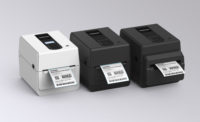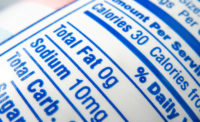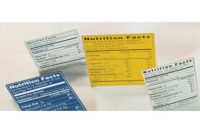New developments in the creation of food labels is providing bakery and snack producers with flexibility to run a wide range of different product sizes and types. Advances have been made in the following areas: printers, software, inks, and marking/coding technology. Of significant note, new label printing systems are designed to enhance product appeal and better communicate information on food content.
Trends include the need to update to new nutritional labeling guidelines, to comply with food traceability standards and to produce package labeling that prompts customer engagement. In additional, vendors see increasing demand for marketing tools such as redeemable coupons being added to food and snack packaging. “For secondary packaging, replacing the low resolution ITF-14 barcode with higher resolution GS1-128 barcodes, capable of containing more data, is a continuing trend,” says David Holliday, director of marketing communications, ProMach Labeling and Coding, Fort Worth, TX.
Direct thermal and thermal transfer seem to be the more popular methods of label printing in response to the constant changing of labeling requirements and large SKU counts in the bakery and snack industry, according to Michael Gerrity, technical sales and business development, Fortis Solutions, Virginia Beach, VA. “They are cost-effective and versatile and can complement decorative labels printed via flexography, digital, and inkjet.”
One of the most prominent trends in labeling is the need for clearer labeling that indicates sustainable options and recyclability, according to Sean Riley, senior director, media and communications for PMMI, Reston, VA, who says these advances will increase in the next five years alongside ingredient modifications and a trend towards healthier processed foods.
“In its ‘Global Packaging Trends’ report, Mintel cites label overcrowding and the birth of Clean Label 2.0 as one of the five biggest trends impacting the food industry,” Riley says. “Cluttered labels create confusion at a time when consumers seek accessible product information that is easy to understand. Mintel’s report suggests that Clean Label 2.0 as a minimalist approach to clean label ideology. Packages need to provide consumers with two or three pieces of essential information, perhaps highlighting the ingredients but not overwhelming the consumer with too many identifiers.”
Brother Mobile Solutions - Rugged Jet 3200 Series
Brother Mobile Solutions, Broomfield, CO, has introduced the Rugged Jet 3200 Series of thermal label printers, which are designed to help address changing business needs across retail markets. “The printer is perfect for many applications within the bakery and snack industry–where fast, accurate, on-demand, and in-aisle labeling plays an increasingly important role,” says Dan Lydigsen, director of retail and hospitality.
The Rugged Jet 3200 features a microprocessor that enables users to quickly connect–and stay connected–to print on-the-go using a variety of connectivity options, including Bluetooth, WiFi, and AirPrint. Its lithium-ion battery comes equipped with multiple charging options such as simultaneous firmware updates, which allow users to recharge batteries and update the printer overnight, minimizing downtime during work hours.
Epson America Inc. - C4000 Label Printers
ColorWorks C6000-Series and new C4000 label printers, from Epson America Inc., Long Beach, CA, now integrate with food weigh scales to print on-demand color labels for bakery and snack items. The scale plugs directly into the USB port on the ColorWorks printer; no separate PC or accessory is needed. Zebra Programming Language makes it easy for the printer and scale to communicate, allowing retailers to set an item on the scale and print a label with three taps.
“The label includes all necessary information: item, weight, ingredients, barcode, safe handling information and address,” says Bonny Rindahl, product manager, Commercial Labels. “Integrating color into fresh food labels allows businesses to show a picture of a food product, highlight allergens to promote customer safety, add branding, and visually identify freshness and expiration dates.”
Novexx Solutions - XLP 60X Label Printer
Novexx Solutions, Eching, Germany, has introduced the XLP 60X industrial label printer, a thermal transfer and direct thermal printer. It can print labels for food products, cartons, or pallets and the standard 300-dpi print head ensures a high-quality print. It offers quick change of label and ribbon material, large 600-meters ribbon capacity and open print module for easy cleaning.
The XLP 60X also features a Ribbon Save mechanism that automatically stops the feed of a thermal transfer ribbon at every point where the label is not to be printed. “Material consumption can be significantly reduced,” says Shawn Minehart, sales director North America. “The print head is only lowered and heated when printing is required. The total amount of ribbon and cost savings depends on the print data and the distances between the individual print images.”
Primera Technology Inc. - LX3000 Color Label Printer
Primera Technology Inc., Plymouth, MN, has introduced the LX3000 Color Label Printer featuring large ink tanks that yield lower cost per label. The printer can be ordered as either a dye or pigment ink printer. Pigment inks, when used with synthetic label material such as polyester and polypropylene, are best for any products that need water resistance; dye is best for paper stocks and provides the most vivid colors. The system prints at speeds of up to 4.5 inches per second at a maximum print width of 8.25 inches.
“The Big Ink system on LX3000 uses new dye and pigment inks optimized for brightness, durability and optical density,” says Kellie Garber, senior global product manager. “In particular, its process black has a high optical density for the blackest blacks ever released by Primera in a CMY (cyan, magenta and yellow) printer.” Process black offers better water resistance, compatibility with a broader range of specialty label media and more resistance to smearing.
ProMach Labeling and Coding - MFlex Labeling Systems
ProMach Labeling and Coding, EPI brand, has introduced the MFlex range of labeling systems, which can be configured for a wide range of applications. Every configuration has the same human machine interface, is designed for ease of use, quick setup (using built-in product recipes) and comprehensive diagnostics for technicians.
“A new motion control system, Titanium Drive, electronically synchronizes all of the machine models. If you were to stop the labeler when it is midway through a label application, it will carry on where it left off when restarting,” Holliday says. MFlex labelers are rated to IP65 as standard, so everything is sealed; no dust or water can enter the system.
Toshiba America Business Solutions - Transfer Barcode Printers
Toshiba America Business Solutions, Lake Forest, CA, is focusing on development of linerless labeling for thermal transfer barcode printers. The company also is investing in duplex linerless technology, which expands opportunities to market to customers as well as to inform on a single label–one side for required information, the other side for promotional content. Radio-frequency identification (RFID) development will continue, enabling better inventory control in store.
Besides investing in RFID and linerless labeling, Toshiba continues to utilize real-time clock (RTC) functionality in software, according to Jessica Bernardo, senior product marketing manager, Label Print Solutions. “RTC could improve tracking for food packaging applications because it time stamps the moment a package is labeled rather than when the print job is sent. This leads to more efficient inventory tracking while facilitating the delivery of food with more accurate expiration dates.”
Videojet Technologies Inc. - Thermal Transfer Overprinting Printers
Videojet Technologies Inc., Chicago, has made software upgrades to its thermal transfer overprinting printers. For example, the 6530 53-mm printer now features a built-in Videojet iAssure™ print quality checker, which is designed to reduce waste and rework by detecting low-quality printing before products leave the factory. “An upgrade to iAssure gives users guidance on fixing the root cause of print quality issues to help ensure the proper troubleshooting paths are taken, thus increasing operational efficiency and protecting the user’s bottom line,” says John Cowen, product manager.
For thermal inkjet printing, Videojet is developing new inks that can meet bakery and snack producers’ demands for low-odor, no-CMR (carcinogens, mutagens, or reproductive toxins) consumables. “The new ethanol-based Cool Black Solvent ink is compatible with Videojet thermal inkjet printers and delivers excellent adhesion on substrates such as flexible films, paperboard and coated paper stock,” Cowen adds.




